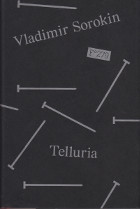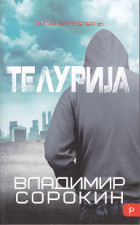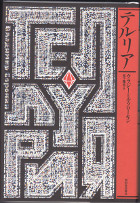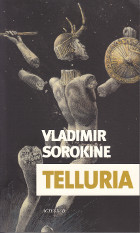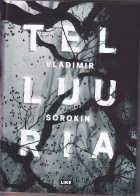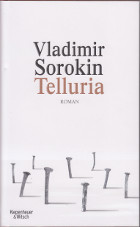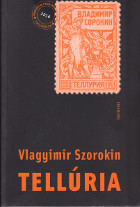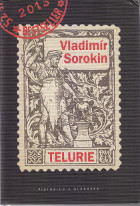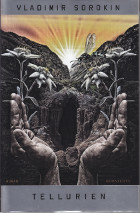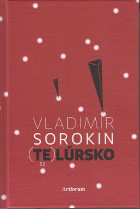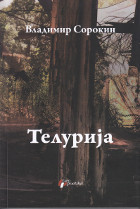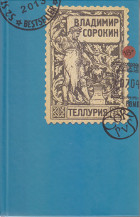Vladimir Sorokin
Telluria
Proposal
Published by
- Pistorius & Olsanska, Czech Republic
- Corpus, Russia
- Norstedts, Sweden
- Gondolat, Hungary
- Artforum, Slovak Republic
- Actes Sud, France
- Kiepenheuer & Witsch, Germany
- Geopoetika, Serbia
- Flamme, Oslo
- Like, Finland
- Agora, Poland
- Kawade Shobo Shinsha, Japan
- Bata press milenium, North Macedonia
- Beijing Publishing Group, China
- Vandkunsten, Denmark
- New York Review of Books, USA
Vladimir Sorokin’s new novel “Telluria” is densely populated with characters from different countries, and even eras: partisans and princes, gays and pagans, party leaders (some long dead, and some who have become “small”) and zoomorphs (human animals), peasants and proletarians and new Knights Templar, a harem of phalluses and faithful warriors of Allah, Batman and a dog-headed poet and philosopher who feed on carrion from the battle field… The novel takes place in the mid-21st century in Eurasia, which after a long and bloody war with the warriors of Allah has acquired new borders. The world has been transformed. “After the collapse of ideological, geopolitical and technological Utopias, it has finally plunged into a blessed enlightened Middle Ages. The world has become human in size. Nations have found themselves. The human being has ceased to become the sum of technologies.” Russia has split into numerous independent principalities: Moscow with a sovereign, fenced off from the Chinese Moscow region by a high wall, the Stalinist Soviet Socialist Republic (SSSR) founded by Stalinist oligarchs, with a cult of Stalin and a flourishing tourist business because of it, Ryazan with princes, serfs and moose hunting, the Far East Republic, with many songs – Japanese, Chinese and Russian – a “Far East symphony”, the Urals Republic, where people live in dug-outs in a state of permanent war for the idea of the United States of the Urals. In every chapter, and there are 50 of them, readers find themselves in a new location: Stockholm, Moscow, Barcelona, Paris, Bern, and in the capital of the Rhein-Westphalian republic of Cologne, where the first post-war carnival takes place…
For many people, the “holy” war is continuing. The castle of La Couvertoirade in the Pyrenees is the “legend of the new Europe, the hope of all European Christians, the stronghold of the triumph of the spirit and the heroism of the flesh”. From here, knights lead by the great master of the order of the Templars, Geoffroy de Payns, crushed the Salafists in Toulouse and Marseille, freed Nice and Perpignan, sank Salafist boats by the Îles d’Hyères, united the efforts of all European Christians and defended the Christian civilization on the continent. Now they are preparing for the 13th crusade flight against the main nest of the Salafists. Three-meter flying robots armed with automatic cannons, rockets and flamethrowers target Istanbul. “Like comets, the knights sped to the distant target on the Black Sea coast. At exactly the same time, hundreds of similar comets took off from launch pads near Liege, Breda, from the forests of Siewierz, the southern Carpathian peaks, the shores of Lake Starnberg and the Solovetsky Islands.”
Empires collapse, revolutions take place, bloody wars rage – everything repeats itself from century to century. And although new technologies appear: cars that drive on potato “gasoline”, high-speed boots, “smarts” that allow lovers who are not destined to meet to have virtual sex on a virtual beach, still the deficit of oil forces many people to ride horses, moonshine is made in the old way, and there are just as many fools and lunatics, faithful subjects and anarchists as before. Humanity is moved by the same dark passions and instincts.
Russian peasants and proletarians continue to drink just as hard as ever, and resemble a “biomass only capable of stealing and groveling”, while revolutionaries, even those who have become “small”, prepare for the “last and decisive battle”, members of the intelligentsia plunge into decadence, schoolgirls are prepared to give themselves to the first man that comes their way in exchange for a meal at a restaurant, aristocrats continue the old discussion that the Jews were to blame for the October 1917 revolution, and Kremlin “fighters” still battle with demonstrations on Bolotnaya Square, but using new technologies – fermenting agents tested in the laboratories of the Lyubyanka that turn uprisings into pasta, which is quickly sent to freezing chambers for further processing. Church prayers have turned into an apology of the absurd: “If the Sovereign seeks a top manager to the glory of the Communist Party and all the saints for the happiness of the people, only by the will of God, by the order of international imperialism, by the will of enlightened Satanism, by the burning of Orthodox patriotism…” The daughter of the sovereign of Moscow looks for “patriotic” enjoyment in the proletarian village: “total mercilessness of desire”, “stunning helplessness of desire”, “how important it all is – to give yourself to your people”, “so they love you”.
Things are no better in the former united Europe: there is a fashion for left-wing ideas and tourist trips to the SSSR, a demand for super-drugs, hatred for foreigners with other religions, the success of the fashionable philosopher Likuidas, with his book “Dochsein and Postzeit” that polemicizes with “Nichtsein and Postzeit” by the great Mortimesco. With a little help of the tellurium drug Likuidas has already visited Stalin twice – first as an executioner of the NKVD, who interrogated the theater director Meyerhold, and then as Meyerhold himself, whom the investigator deprived of sleep and beat with a rubber truncheon, as a result of which Likuidas wrote an energetic existential philosophical essay about these telluric corpses entitled “The machine of forced and non-forced desired violence”.
Does history repeat itself as a farce? Not quite, because people now have the opportunity to escape into another world – the world of their fantasies, the world of dreams and happiness, which do not exist on Earth. “We realize that there will be no technological paradise on Earth. Or any paradise at all. The Earth was given to us as an island of overcoming. And everyone decides themselves what to overcome and how. Themselves!” But now humanity has the tellurium, which is connecting the chapters into a common narrative, and makes the dreams of happiness and the meaning of life of many of the characters come true.
“The qualities of natural tellurium were not discovered by archeologists until 2022 in the mountains of the Altai in an ancient Zoroastrian temple founded in the 4th century BC…In the Maktulu cave, 48 skeletons were found lying in identical poses, with their arms crossed over their chests. All of the skulls were pierced in the same place (42 mm) with wedges of natural tellurium … Subsequently, scientists at the Beijing Institute for the Brain, working with colleagues from Stanford University, conducted a series of studies on volunteers, and received phenomenal results: the tellurium wedges of the Zoroastrians hammered into a certain place on the head cause people to feel a permanent euphoric state and lose all sense of time… In 2026, experiments with tellurium wedges were prohibited by a UN convention, and the wedges of natural tellurium were classified as a hard drug.” In 2028, in the place of the Altai province, a new nation was proclaimed – the Democratic Republic of Telluria, and the commander of the Legion of the “Blue Hornets”, Colonel Jean-Francois Trocart, was elected as first president. Several years later, Telluria was recognized by 24 nations of the international community, and from an agrarian country, it transformed into the most flourishing nation in the world, and the most respected and highly-paid people became the joiners, who hammered tellurian nails into the skulls of people who yearned to escape to other worlds, and realize their dreams and hopes.
The dreams of the characters in the novel vary: to save a kitten from a burning house in a city occupied by Wahhabists, to become a “pupil of Christ”, to turn into a wasp in order to lay larva of faithfulness in the bodies of newborn babies, to see the crystal palace of immortal and sinless super-people with their own eyes, to read poems to the Ocean or to become a new Zarathustra, to meet with a dead husband and stay with him… Everyone needs tellurium, in order to know “how to go on living”.
And above the earth comes a howl in the style of Allen Ginsberg:
“I saw the worst minds of my generation, torn by tellurium out of dark madness, minds
overcoming the daily sludge of mundane life,
throwing the concrete crust of bourgeois self-confidence and stupid self-satisfaction from their souls,
stomping in a moment on the chimera of earthly determinism,
rubbing from their eyes the ashy and fury mold of fatigue in perception of the world,
crushing with their new arms the sticky shell of depression,
spitting with the hot magma of fullness into the miserable face of thousand-year spleen,
dying with a new breath of life into the empty eye sockets of dusty libraries,
throwing thousands of books of schizophrenic hopelessness to the wind, bringing readers to the mad house and suicide,
ramming a shining telluric spike into the grave of earthly despondency,
breaking the spine of the gloomy dragon of human disappointment in oneself,
rising forever from the dust of the weakness of past generations and raising up their shining bodies to the peaks of New Reality.
breaking the chains of Time that were rusty from blood, sweat and tears
(…)
Tellurium! New horizons of hopes!
Tellurium, shining like the vestments of angels!
Tellurium, gleaming like the lightening of the prophet!
Tellurium, plunging like a divine scalpel into the brains of millions!
Tellurium, moving the boundaries of the human!
Tellurium, filling people with confidence in the past, present and future! Confidence! Happiness! Joy! To the brim! To ecstasy! Until their blood boils! To the Great Peace of the Soul!
Tellurium, whose name is Overcoming Time and Space!”
But Sorokin wouldn’t be Sorokin if he didn’t give the reader the chance to escape from a world which cannot live without tellurium, and become truly free. The joiner Magnus Pospeshny, who drives nails into the head of the Great master of the Templars, is amazed by the sight of towns and villages untouched by the war as he travels to La Couvertoirade: “Time has stopped. It smelt of pre-war Europe. It was the smell of childhood.” Memory blots out the “brave new world”, if only for a few brief minutes. A female donkey escapes from Catholics and Wahhabists on a farm of pagans in the Swiss town of Ascona, where they only drink milk – the gift of the moon. A horsewoman, roaming the steppe on a boisterous mare, escapes from a town where people are moved from a stone coffin house into a wooden coffin: “I fled from the dark town, from the stone coffin. I exchanged my mourning mother and slow-moving father for a mare and a crossbow. The mare is my mother. The crossbow is my father… The water, the stars and the steppe are my friends. My world is the open space of the steppe. To track and hide, to conceal myself and attack, to pursue and follow, to love and kill – these are my desires”. A peasant runs away from the world to live in the forest: “We don’t need anything superfluous, no women, wine, pyramids, nails, war, money or those bosses of yours. That’s how I’ll live out my life. I have a house, the roof doesn’t leak, I have something to eat… Only pray to the sun… What else does a person need?” Like the German romantics, Sorokin finds a way out of the dead-end of civilization – the characters who reject the tellurium find their happiness in unity with nature. For them, solitude only exists among people.
The fabric of the novel, which resembles battle canvases in its form and format, not only has an amazing scale – 50 chapters from the life of people from the mid-21st century, which fit into a jigsaw puzzle thanks to the tellurium and the ability to enter people’s dreams. Each chapter is written in its own unique style, and there is no other writer capable of juggling a palette of styles like this.
